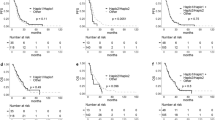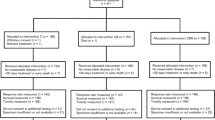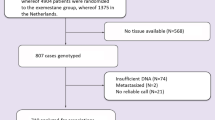Abstract
Biomarkers for bevacizumab efficacy in metastatic breast cancer (MBC) are of urgent need. The genetic variability of genes involved in angiogenesis could explain the interpatient variability of drug effects. For this biomarker study DNA was extracted from tumor blocks or blood samples of patients with human epidermal growth factor receptor 2 (HER2)-negative MBC treated with bevacizumab in combination with chemotherapy (bevacizumab cohort, 163 patients) or chemotherapy only (control cohort, 105 patients). We assessed the correlation of 10 single-nucleotide polymorphisms (SNPs) in genes modulating angiogenesis (vascular endothelial growth factor-A (VEGF-A), VEGF receptor 1 (VEGFR-1), serine threonine kinase 39 (STK39)) or hypertension (endothelin-1 and uromodulin) with outcome and toxicity. In the bevacizumab cohort, the SNP rs5370-TT in endothelin-1 (EDN1) showed a significantly shorter median overall survival (OS, 6.3 vs 21.3 months; hazard ratio (HR) 2.89, 95% confidence interval (CI) 1.34–6.26; log-rank P=0.0069) and a trend toward worse median progression-free survival (3.5 vs 7.9 months; HR 2.05, 95% CI 0.96–4.39; log-rank P=0.065) compared with the alternate genotypes combined. Similarly, patients harboring the VEGF-936 (rs3025039) TT alleles showed a significantly shorter median OS than patients with VEGF-936 CC or CT (14.9 vs 21.3 months; HR 2.37, 95% CI 1.09–5.13; P=0.0286). In multivariate analysis including important clinical parameters like disease-free survival (DFS), adjuvant chemotherapy, ECOG (Eastern Cooperative Oncology Group) performance score, histologic subtype, grade, hormone receptor status, visceral metastases and treatment line, only the association of rs5370 (EDN1) with OS was still statistically significant (P=0.012). In the control cohort, no association of the EDN1 genotype with outcome was seen, suggesting a predictive value for bevacizumab. In conclusion, the SNP rs5370 in endothelin-1 could help identifying patients who unlikely gain any benefit from bevacizumab.
This is a preview of subscription content, access via your institution
Access options
Subscribe to this journal
Receive 6 print issues and online access
$259.00 per year
only $43.17 per issue
Buy this article
- Purchase on Springer Link
- Instant access to full article PDF
Prices may be subject to local taxes which are calculated during checkout

Similar content being viewed by others
References
Brufsky AM, Hurvitz S, Perez E, Swamy R, Valero V, O'Neill V et al. RIBBON-2: a randomized, double-blind, placebo-controlled, phase III trial evaluating the efficacy and safety of bevacizumab in combination with chemotherapy for second-line treatment of human epidermal growth factor receptor 2-negative metastatic breast cancer. J Clin Oncol 2011; 29: 4286–4293.
Gianni L, Romieu GH, Lichinitser M, Serrano SV, Mansutti M, Pivot X et al. AVEREL: a randomized phase III trial evaluating bevacizumab in combination with docetaxel and trastuzumab as first-line therapy for her2-positive locally recurrent/metastatic breast cancer. J Clin Oncol 2013; 31: 1719–1725.
Miles DW, Chan A, Dirix LY, Cortes J, Pivot X, Tomczak P et al. Phase III study of bevacizumab plus docetaxel compared with placebo plus docetaxel for the first-line treatment of human epidermal growth factor receptor 2-negative metastatic breast cancer. J Clin Oncol 2010; 28: 3239–3247.
Miller K, Wang M, Gralow J, Dickler M, Cobleigh M, Perez EA et al. Paclitaxel plus bevacizumab versus paclitaxel alone for metastatic breast cancer. N Engl J Med 2007; 357: 2666–2676.
Robert NJ, Dieras V, Glaspy J, Brufsky AM, Bondarenko I, Lipatov ON et al. RIBBON-1: randomized, double-blind, placebo-controlled, phase III trial of chemotherapy with or without bevacizumab for first-line treatment of human epidermal growth factor receptor 2-negative, locally recurrent or metastatic breast cancer. J Clin Oncol 2011; 29: 1252–1260.
Miles DW, Dieras V, Cortes J, Duenne AA, Yi J, O'Shaughnessy J . First-line bevacizumab in combination with chemotherapy for HER2-negative metastatic breast cancer: pooled and subgroup analyses of data from 2447 patients. Ann Oncol 2013; 24: 2773–2780.
Rossari JR, Metzger-Filho O, Paesmans M, Saini KS, Gennari A, de Azambuja E et al. Bevacizumab and breast cancer: a meta-analysis of first-line phase III studies and a critical reappraisal of available evidence. J Oncol 2012; 2012: 417673.
Wagner AD, Thomssen C, Haerting J, Unverzagt S . Vascular-endothelial-growth-factor (VEGF) targeting therapies for endocrine refractory or resistant metastatic breast cancer. Cochrane Database Syst Rev 2012: CD008941.
Miles DW, de Haas SL, Dirix LY, Romieu G, Chan A, Pivot X et al. Biomarker results from the AVADO phase 3 trial of first-line bevacizumab plus docetaxel for HER2-negative metastatic breast cancer. Br J Cancer 2013; 108: 1052–1060.
Van Cutsem E, Jayson G, C Dive, Dilba P, de Haas S, Wild N et al. Analysis of blood plasma factors in the AVITA phase III randomized study of bevacizumab (bev) with gemcitabine-erlotinib (GE) in patients (pts) with metastatic pancreatic cancer (mPC). Eur J Cancer 2011; 47: 95–96.
Van Cutsem E, de Haas S, Kang YK, Ohtsu A, Tebbutt NC, Ming Xu J et al. Bevacizumab in combination with chemotherapy as first-line therapy in advanced gastric cancer: a biomarker evaluation from the AVAGAST randomized phase III trial. J Clin Oncol 2012; 30: 2119–2127.
Cameron D, Brown J, Dent R, Jackisch C, Mackey J, Pivot X et al. Adjuvant bevacizumab-containing therapy in triple-negative breast cancer (BEATRICE): primary results of a randomised, phase 3 trial. Lancet Oncol 2013; 14: 933–942.
Jubb AM, Miller KD, Rugo HS, Harris AL, Chen D, Reimann JD et al. Impact of exploratory biomarkers on the treatment effect of bevacizumab in metastatic breast cancer. Clin Cancer Res 2011; 17: 372–381.
Foernzler D, Delmar P, Kockx M, Cassidy J, Saltz L, Scherer S . Tumor tissue based biomarker analysis in NO16966: a randomized phase III study of first-line bevacizumab in combination with oxaliplatin-based chemotherapy in patients with mCRC. ASCO GI Cancers Symposium, 22–24 January 2010 Orlando, FL, USA (abstract 374).
Boisen MK, Dehlendorff C, Linnemann D, Nielsen BS, Larsen JS, Osterlind K et al. Tissue microRNAs as predictors of outcome in patients with metastatic colorectal cancer treated with first line capecitabine and oxaliplatin with or without bevacizumab. PLoS One 2014; 9: e109430.
Chan J, Kiet T, Sherman A, Fuh K, Ueda S, Brooks R et al. MicroRNA as a novel predictor of response to bevacizumab in recurrent serous ovarian cancer: an analysis of The Cancer Genome Atlas. Gynecol Oncol 2014; 120: S4–S5.
Gampenrieder SP, Hamacher F, Rinnerthaler G, Hufnagl C, Hackl H, Romeder F et al. MicroRNAs correlating with outcome in patients treated with first-line bevacizumab for metastatic breast cancer. Cancer Research 2015; 75 (9 Supplement): P4-07-03.
Osterlund P, Soveri LM, Isoniemi H, Poussa T, Alanko T, Bono P . Hypertension and overall survival in metastatic colorectal cancer patients treated with bevacizumab-containing chemotherapy. Br J Cancer 2011; 104: 599–604.
Rini BI, Halabi S, Rosenberg JE, Stadler WM, Vaena DA, Archer L et al. Phase III trial of bevacizumab plus interferon alfa versus interferon alfa monotherapy in patients with metastatic renal cell carcinoma: final results of CALGB 90206. J Clin Oncol 2010; 28: 2137–2143.
Scartozzi M, Galizia E, Chiorrini S, Giampieri R, Berardi R, Pierantoni C et al. Arterial hypertension correlates with clinical outcome in colorectal cancer patients treated with first-line bevacizumab. Ann Oncol 2009; 20: 227–230.
Schneider BP, Wang M, Radovich M, Sledge GW, Badve S, Thor A et al. Association of vascular endothelial growth factor and vascular endothelial growth factor receptor-2 genetic polymorphisms with outcome in a trial of paclitaxel compared with paclitaxel plus bevacizumab in advanced breast cancer: ECOG 2100. J Clin Oncol 2008; 26: 4672–4678.
Mir O, Coriat R, Cabanes L, Ropert S, Billemont B, Alexandre J et al. An observational study of bevacizumab-induced hypertension as a clinical biomarker of antitumor activity. Oncologist 2011; 16: 1325–1332.
De Stefano A, Carlomagno C, Pepe S, Bianco R, De Placido S . Bevacizumab-related arterial hypertension as a predictive marker in metastatic colorectal cancer patients. Cancer Chemother Pharmacol 2011; 68: 1207–1213.
Hurwitz HI, Douglas PS, Middleton JP, Sledge GW, Johnson DH, Reardon DA et al. Analysis of early hypertension and clinical outcome with bevacizumab: results from seven phase III studies. Oncologist 2013; 18: 273–280.
Gampenrieder SP, Romeder F, Muss C, Pircher M, Ressler S, Rinnerthaler G et al. Hypertension as a predictive marker for bevacizumab in metastatic breast cancer: results from a retrospective matched-pair analysis. Anticancer Res 2014; 34: 227–233.
Formica V, Palmirotta R, Del Monte G, Savonarola A, Ludovici G, De Marchis ML et al. Predictive value of VEGF gene polymorphisms for metastatic colorectal cancer patients receiving first-line treatment including fluorouracil, irinotecan, and bevacizumab. Int J Colorectal Dis 2011; 26: 143–151.
Kim JC, Kim SY, Cho DH, Ha YJ, Choi EY, Kim CW et al. Novel chemosensitive single-nucleotide polymorphism markers to targeted regimens in metastatic colorectal cancer. Clin Cancer Res 2011; 17: 1200–1209.
Koutras A, Antonacopoulou A, Fostira F, Briasoulis EC, Sgouros I, Koumarianou A et al. Vascular endothelial growth factor polymorphisms and clinical outcome in colorectal cancer patients treated with irinotecan-based chemotherapy and bevacizumab in the first-line setting. J Clin Oncol 2010; 28: 15s (Suppl; abstract 3587).
Lambrechts D, Claes B, Delmar P, Reumers J, Mazzone M, Yesilyurt BT et al. VEGF pathway genetic variants as biomarkers of treatment outcome with bevacizumab: an analysis of data from the AViTA and AVOREN randomised trials. Lancet Oncol 2012; 13: 724–733.
Loupakis F, Ruzzo A, Salvatore L, Canestrari E, Cremolini C, Santini D et al. VEGF gene polymorphisms in the prediction of benefit from first-line FOLFIRI plus bevacizumab (BV) in metastatic colorectal cancer (mCRC) patients (pts). Eur J Cancer 2009; 7: 357 (abstract 6115).
Loupakis F, Ruzzo A, Salvatore L, Cremolini C, Masi G, Frumento P et al. Retrospective exploratory analysis of VEGF polymorphisms in the prediction of benefit from first-line FOLFIRI plus bevacizumab in metastatic colorectal cancer. BMC Cancer 2011; 11: 247.
Pander J, Wessels JA, Gelderblom H, van der Straaten T, Punt CJ, Guchelaar HJ . Pharmacogenetic interaction analysis for the efficacy of systemic treatment in metastatic colorectal cancer. Ann Oncol 2011; 22: 1147–1153.
Schultheis AM, Lurje G, Rhodes KE, Zhang W, Yang D, Garcia AA et al. Polymorphisms and clinical outcome in recurrent ovarian cancer treated with cyclophosphamide and bevacizumab. Clin Cancer Res 2008; 14: 7554–7563.
Zhang W, Dahlberg SE, Yang D, Sandler AB, Brahmer JR, Schiller JH et al. Genetic variants in angiogenesis pathway associated with clinical outcome in NSCLC patients (pts) treated with bevacizumab in combination with carboplatin and paclitaxel: Subset pharmacogenetic analysis of ECOG 4599. J Clin Oncol 2009; 7: 15s (abstract 8032)).
Etienne-Grimaldi MC, Formento P, Degeorges A, Pierga JY, Delva R, Pivot X et al. Prospective analysis of the impact of VEGF-A gene polymorphisms on the pharmacodynamics of bevacizumab-based therapy in metastatic breast cancer patients. Br J Clin Pharmacol 2011; 71: 921–928.
Chen LY, Zhao WH, Tian W, Guo J, Jiang F, Jin LJ et al. STK39 is an independent risk factor for male hypertension in Han Chinese. Int J Cardiol 2012; 154: 122–127.
Padmanabhan S, Melander O, Johnson T, Di Blasio AM, Lee WK, Gentilini D et al. Genome-wide association study of blood pressure extremes identifies variant near UMOD associated with hypertension. PLoS Genet 2010; 6: e1001177.
Rankinen T, Church T, Rice T, Markward N, Leon AS, Rao DC et al. Effect of endothelin 1 genotype on blood pressure is dependent on physical activity or fitness levels. Hypertension 2007; 50: 1120–1125.
Schneider BP, Skaar TC, Sledge GW, Badve S, Li L, Flockhart DA . Analysis of angiogenesis genes from paraffin-embedded breast tumor and lymph nodes. Breast Cancer Res Treat 2006; 96: 209–215.
Grambsch PM, Therneau TM . Proportional hazards tests and diagnostics based on weighted residuals. Biometrika 1994; 81: 526.
Benjamini Y, Hochberg Y . Controlling the false discovery rate: a practical and powerful approach to multiple testing. J R Stat Soc Series B Methodol 1995; 57: 289–300.
Ferlay J, Steliarova-Foucher E, Lortet-Tieulent J, Rosso S, Coebergh JW, Comber H et al. Cancer incidence and mortality patterns in Europe: estimates for 40 countries in 2012. Eur J Cancer 2013; 49: 1374–1403.
Montero AJ, Avancha K, Gluck S, Lopes G . A cost-benefit analysis of bevacizumab in combination with paclitaxel in the first-line treatment of patients with metastatic breast cancer. Breast Cancer Res Treat 2012; 132: 747–751.
Sandoval YH, Atef ME, Levesque LO, Li Y, Anand-Srivastava MB . Endothelin-1 signaling in vascular physiology and pathophysiology. Curr Vasc Pharmacol 2014; 12: 202–214.
Bagnato A, Loizidou M, Pflug BR, Curwen J, Growcott J . Role of the endothelin axis and its antagonists in the treatment of cancer. Br J Pharmacol 2011; 163: 220–233.
Lankhorst S, Kappers MH, van Esch JH, Danser AH, van den Meiracker AH . Hypertension during vascular endothelial growth factor inhibition: focus on nitric oxide, endothelin-1, and oxidative stress. Antioxid Redox Signal 2013; 20: 135–145.
Kaseb AO, Garrett-Mayer E, Morris JS, Xiao L, Lin E, Onicescu G et al. Efficacy of bevacizumab plus erlotinib for advanced hepatocellular carcinoma and predictors of outcome: final results of a phase II trial. Oncology 2012; 82: 67–74.
Dirican A, Kucukzeybek Y, Alacacioglu A, Varol U, Aksun S, Bayoglu IV et al. Impact of pre-angiogenic factors on the treatment effect of bevacizumab in patients with metastatic colorectal cancer. Med Oncol 2014; 31: 905.
Panoulas VF, Douglas KM, Smith JP, Taffe P, Stavropoulos-Kalinoglou A, Toms TE et al. Polymorphisms of the endothelin-1 gene associate with hypertension in patients with rheumatoid arthritis. Endothelium 2008; 15: 203–212.
Pinto-Sietsma SJ, Herrmann SM, Schmidt-Petersen K, Niu T, Hillege HL, Janssen WM et al. Role of the endothelin-1 gene locus for renal impairment in the general nondiabetic population. J Am Soc Nephrol 2003; 14: 2596–2602.
Yoshimoto S, Ishizaki Y, Sasaki T, Murota S . Effect of carbon dioxide and oxygen on endothelin production by cultured porcine cerebral endothelial cells. Stroke 1991; 22: 378–383.
Palmirotta R, Ferroni P, Ludovici G, Martini F, Savonarola A, D'Alessandro R et al. VEGF-A gene promoter polymorphisms and microvascular complications in patients with essential hypertension. Clin Biochem 2010; 43: 1090–1095.
Hamedian AA, Esteghamati A, Noshad S, Mozafari M, Moin-Tavakkoli H, Nakhjavani M et al. Vascular endothelial growth factor (VEGF) +405 C/G polymorphism is associated with essential hypertension in a population from Tehran of Iran. Mol Biol Rep 2012; 39: 6213–6218.
Lu H, Shu XO, Cui Y, Kataoka N, Wen W, Cai Q et al. Association of genetic polymorphisms in the VEGF gene with breast cancer survival. Cancer Res 2005; 65: 5015–5019.
Krippl P, Langsenlehner U, Renner W, Yazdani-Biuki B, Wolf G, Wascher TC et al. A common 936 C/T gene polymorphism of vascular endothelial growth factor is associated with decreased breast cancer risk. Int J Cancer 2003; 106: 468–471.
Smith KC, Bateman AC, Fussell HM, Howell WM . Cytokine gene polymorphisms and breast cancer susceptibility and prognosis. Eur J Immunogenet 2004; 31: 167–173.
Schneider BP, Radovich M, Sledge GW, Robarge JD, Li L, Storniolo AM et al. Association of polymorphisms of angiogenesis genes with breast cancer. Breast Cancer Res Treat 2008; 111: 157–163.
Beeghly-Fadiel A, Shu XO, Lu W, Long J, Cai Q, Xiang YB et al. Genetic variation in VEGF family genes and breast cancer risk: a report from the Shanghai Breast Cancer Genetics Study. Cancer Epidemiol Biomarkers Prev 2011; 20: 33–41.
Acknowledgements
This research project was partially supported by ROCHE Austria GmbH.
Author information
Authors and Affiliations
Corresponding author
Ethics declarations
Competing interests
Employment or leadership position: none; consultant or advisory role: SPG, GR, BM and RG; stock ownership: none; speakers honoraria: BM and RG; travel grants: SPG, GR, CH, FR, CMF, CH-K, BM and RG; research funding: SPG, GR, FH, CH, BM and RG.
Additional information
Supplementary Information accompanies the paper on the The Pharmacogenomics Journal website
Supplementary information
PowerPoint slides
Rights and permissions
About this article
Cite this article
Gampenrieder, S., Hufnagl, C., Brechelmacher, S. et al. Endothelin-1 genetic polymorphism as predictive marker for bevacizumab in metastatic breast cancer. Pharmacogenomics J 17, 344–350 (2017). https://doi.org/10.1038/tpj.2016.25
Received:
Revised:
Accepted:
Published:
Issue Date:
DOI: https://doi.org/10.1038/tpj.2016.25



